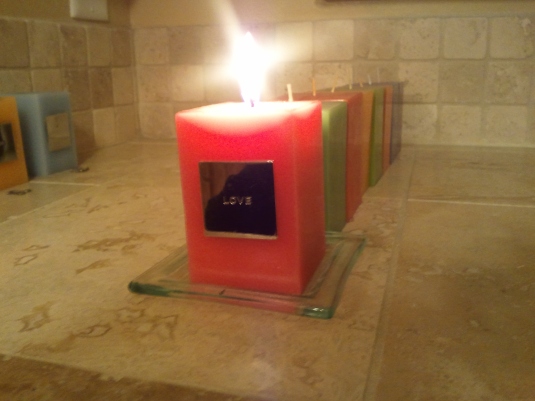I knew that it would take my strong-willed five year-old the longest to understand. He knew Daddy was leaving for a long time, but he didn’t truly understand how long that was. Not really. The measurement of time is still shrouded in eerie mystery. My boy sleeps so hard that he wakes up and asks, “is it day or night?”
Can you remember that? Can you remember when hours, days, and months were inconsequential? Because I’ve tried, and I can’t. I’ve clearly been an adult too long.
Now, in the past I’ve mentioned the existence of our well intentioned but psycho-killeresque shrine. This is the one we erected after the visual impact of 360 or so days was just too exhausting to bear. We moved instead to a monthly system of marking time … the symbolic lighting of twelve candles. Everyone in my house loves fire. Perched on the side of the shrine, symbolizing the triumphant return of our Hero, is a pile of Husband’s valuables not permitted to accompany him on his exotic vacation this year: Navy Wings (he doesn’t need them on his NARMY uniform), a flight suit name patch, the Breitling watch I got him one year, and his wedding ring.

These are pretty neat candles, each one bearing a little silver word placard on the front. Husband bought them for me on my 39th birthday and I never lit them. Of course, the candle we picked for the month of February was “Love.” So on Valentine’s Day we lit the Candle of Luv and The Preschooler asked when Daddy was coming home. I pointed to a candle midway down the row and said matter-of-factly, “here’s where Daddy comes for a visit.” Then I pointed down to the end of the row at the pile of Husband’s familiar things and said plainly, “and here’s where Daddy comes all the way home.”
We had been lighting the candles periodically, but not daily. The Preschooler had finally caught on that we couldn’t light the next one until an entire month had passed. He was slowly understanding what that period of time felt like. I could see he was doing advanced candle trinomials in his head. His eyes fell on each candle one-by-one, and as he looked down the row and paused on each one, together in silence our memories were sparked.
- Halloween. He dressed as a Ninja and got an email account so Daddy could email him.
- Veteran’s Day, and the explanation of the White Table.
- Thanksgiving, when we had our little meal with Nana and watched football rather quietly.
- Christmas: getting a tree, singing at church, sending Daddy’s presents in the mail.
- January, and the impromptu but brave trip to the ER.
And then I watched him turn his gaze to the long stack of candles yet to be lit. He looked at candles but I looked at St. Patrick’s day, Easter, and his sixth birthday. He saw blue and pink wax and I saw summer come and go. He looked at the silver plates with words he couldn’t read … words like “longevity” and “peace” and I saw the colors change, and his first day of Kindergarten. I watched his eyes fill with water that billowed up and held steady, right at the dam’s edge of his little eyelashes. And my heart broke in two, right there. It was hitting him in waves. He was realizing how long a month was. He was realizing how long a year was. He was realizing what deployment meant. He could see it for the first time.
But then, The Preschooler didn’t respond as I expected. He didn’t scream or bawl. He didn’t say, “but that’s a LONG TIME!” or get angry and punch something. Or jump on something. Or break something. These were the reactions I was betting on. These were the outbursts I was prepared for. Something big, something dramatic, something violent and boy-like. Instead, he was silent and lifeless, his arms dangling and his back slouched. I recognized the absolute resignation and my heart broke some more. And then right there on the bathroom floor, he put his face in his hands, let his back fall against the cabinet, and slowly slunk down into a ball, collapsing in a heap. He started to sob.
I wondered how he knew that I secretly cried this way when he and his sister weren’t looking.
I didn’t scoop him up. I just got down on the bathroom floor next to him and held him there for a minute. I thought about the night before Husband left, and what I wanted to hear. I thought about what Husband said, and I repeated parts of it in The Preschooler’s ear, trying hard not to show the breaks and cracks in my own voice:
I’m so proud of you. I know you will be strong. The time will pass quickly sometimes and slowly other times, but at the end of the year it will be the best of homecomings. Daddy misses us, too, so much. He thinks of us every day and he will keep thinking of us. He won’t forget you and you won’t forget him. We will talk whenever we can and we will keep telling him what we are doing. We will keep praying for him until he comes home.
It was silent, and I was happy with my response. And then he asked the question. The Question.
Through tears he turned and looked at me: “How do we know Daddy will not get killed?”
My responsive silence was not awe-inspiring. I had applied diversion tactics to questions about the “bad guys” and why Daddy was carrying a gun in his pictures. I had successfully avoided international politics and news shows during the dinner hour. I had even described Daddy’s abode as a “hotel room” or a “camping tent.” But this was a very pointed question. He was asking me to make a promise I could not make. And he was asking the question that had been nagging at me for months. How, indeed.
I had to hug him tight, because I couldn’t look him in the eyes and say it. But for the first time, for him, I believed the answer to the question.
“Well, everybody dies baby. From the day we are born, we are one step closer to the day God calls us to Heaven. Daddy isn’t any more likely to die today than you or me walking down the street. We aren’t in control of our lifetimes and you know what? Wherever we happen to be or whatever we happen to be doing doesn’t change when that day comes. Only God knows. So where Daddy is and what he’s doing doesn’t mean he’s going to get killed or not get killed just like it means nothing for you or me. Daddy is in a safe place, just like you, because it’s where he is supposed to be in that moment. And no matter what happens, Daddy will be taken care of, and you will be taken care of.”
The Preschooler got it. And I got it, too.
We snuggled lots that evening after blowing the candle out, and the two of us stayed awake in the bed long after Sweet Pea fell asleep. It was good to have safety and arms around each other. We were working through it together. He asked the question again several times, and I gave the same response. He wanted to hear the answer again, and I wanted to say it out loud again. The more I said it, the more true it became.
So I guess it took me a while. In fact, it took me as long as it took The Preschooler. But there it is. Finally. Acceptance.
And now, we can move on …



